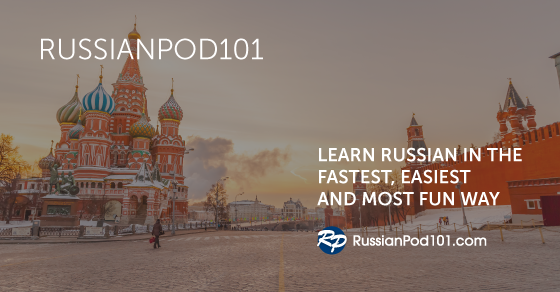برچسب: Parting
-

How to Use Parting Phrases and Expressions
Welcome to Can-Do Russian by RussianPod101.com. In this lesson, you’ll learn how to use parting expressions in Russian. For example, “Goodnight” is Спокойной ночи. (Spokoynoy nochi.) Marina Maslova is talking with her former colleague, Rose Reznikova . As Marina says goodbye, her children join her in saying goodnight. Before you hear their conversation, let’s preview some of its key components. До скорого! (Do skorogo!) “See you soon!” До скорого! До скорого! Спокойной ночи. (Spokoynoy nochi.) “Goodnight” Спокойной ночи. Спокойной ночи. Доброй ночи! (Dobroy nochi!) “Goodnight” Доброй ночи! Доброй ночи! До встречи. Пока! (Do vstrechi. Poka!) “See you. Bye!” До встречи. Пока! До встречи. Пока! Focus on the way each person says goodbye. До скорого! (Do skorogo!) Спокойной ночи. (Spokoynoy nochi.) Доброй ночи! (Dobroy nochi!) До встречи. Пока! (Do vstrechi. Poka!) Once more with the English translation. До скорого! (Do skorogo!) “See you soon!” Спокойной ночи. (Spokoynoy nochi.) “Goodnight.” Доброй ночи! (Dobroy nochi!) “Goodnight!” До встречи. Пока! (Do vstrechi. Poka!) “See you. Bye!” Let’s break down each of these expressions. First, do you remember how Milena says, “See you soon!” До скорого! (Do skorogo!) This starts with до (do), meaning “until.” До . До. Next is скорого (skorogo), meaning something like “upcoming,” in this context. Скорого . Скорого. Note скорого (skorogo) is from скорый (skoryy), meaning “upcoming.” Скорый (Skoryy). Together, до скорого (do skorogo) means something like “until the upcoming,” but translates as “See you soon.” До скорого! (Do skorogo!) Note, до скорого (do skorogo) is a shortened form of the expression до скорого свидания (do skorogo svidaniya) literally “until upcoming appointment,” but translates as “until the coming appointment.” До скорого свидания (Do skorogo svidaniya). When using this expression, свидание (svidaniye), “appointment,” is usually omitted. До скорого! (Do skorogo!) До скорого (Do skorogo) is fairly informal, which indicates a close relationship between Milena and Rose Reznikova , her former colleague. Do you remember how Marina says, “Goodnight.” Спокойной ночи. (Spokoynoy nochi.) “Goodnight.” Спокойной ночи. Спокойной ночи (Spokoynoy nochi), literally means “[have a] restful night.” Спокойной ночи . Спокойной ночи. (Spokoynoy nochi.) And do you remember how Mikhail says, “Goodnight.” Доброй ночи! (Dobroy nochi!) “Goodnight!” Доброй ночи! Доброй ночи (Dobroy nochi), literally “[have a] Goodnight,” but it translates as “Goodnight.” Доброй ночи! Both expressions used by Marina and Mikhail are used to say goodnight to Rose. You use спокойной ночи (spokoynoy nochi), “Goodnight,” when you don’t plan on seeing someone again that night, and when someone is about to go to bed. It’s like saying “have a goodnight’s sleep.” It’s very informal, and rather used with people you are close to. Do you remember how Rose says? “See you. Bye!” До встречи. Пока! (Do vstrechi. Poka!) “See you. Bye!” До встречи. Пока! First is до встречи (do vstrechi), “See you.” До встречи. This starts with до (do), which means “until” in this context. До . До. After this is встречи (vstrechi), “meeting.” Встречи . Встречи. Together, До встречи (Do vstrechi), literally “until meeting [you again],” but translates as “See you.” Note: До встречи (Do vstrechi) is an informal parting greeting, and you should avoid it in a formal situation. Next is пока (poka), “bye.” Пока . Пока. All together, До встречи. Пока! (Do vstrechi. Poka!) “See you. Bye!” До встречи. Пока! (Do vstrechi. Poka!) This sentence is informal. Rose uses this to say goodbye to everyone. She’s the most senior person in the conversation, and she uses informal language to sound friendly. The following expressions are used when you expect to see the person, or people, again in the near future, such as this week or the following week: До встречи (Do vstrechi), “See you.” До скорой встречи (Do skoroy vstrechi), “See you soon.” Увидимся (Uvidimsya), “See you.” When parting, it’s not unusual for speakers to add an additional good-bye phrase to their parting greeting. For example, Всего доброго (Vsego dobrogo) or Всего хорошего (Vsego khoroshego), literally “all of good,” but it translates as “all the best.” Бывай здоров(а) (Byvay zdorov(a)), literally, “be healthy,” but it translates as “take care.” Note: Бывай здоров, is kind of old-fashioned, and it’s often shortened to бывай (byvay). There is an interesting Russian expression worth mentioning: Прощай (Proshchay), meaning “farewell.” You use this phrase when you do not expect to see someone ever again. In colloquial language, Russians often add давай (davay) to good-bye phrases. For example, Давай, пока (Davay, poka). “Bye.” Давай, пока . Literally, давай is a command meaning “give.” Adding давай (davay) does not change the meaning of the greeting. Let’s look at some examples. Listen and repeat or speak along with the native speaker. До скорого! (Do skorogo!) “See you soon!” До скорого! (Do skorogo!) Спокойной ночи. (Spokoynoy nochi.) “Goodnight.” Спокойной ночи. (Spokoynoy nochi.) До встречи. (Do vstrechi.) “See you.” До встречи. (Do vstrechi.) Пока! (Poka!) “Bye!” Пока! (Poka!) Доброй ночи! (Dobroy nochi.) “Goodnight!” Доброй ночи! (Dobroy nochi.) До свидания. (Do svidaniya.) “Goodbye.” До свидания. (Do svidaniya.) Did you notice the last parting expression? До свидания. (Do svidaniya.) “Goodbye.” This starts with до (do), “until” in this context. До. Next is свидания (svidaniya). “Appointment.” Свидания . Свидания. Together it’s до свидания (Do svidaniya), “goodbye.” До свидания.. До свидания. You can use this greeting in all situations, no matter if you plan to meet the person again or not. It can be used in formal and informal situations. До свидания (Do svidaniya). Let’s review. Respond to the prompts by speaking aloud. Then repeat after the native speaker, focusing on pronunciation. Ready? Do you remember how to say, “See you soon!” До скорого! (Do skorogo!) До скорого! (Do skorogo!) And how Marina says, “Goodnight.” Спокойной ночи. (Spokoynoy nochi.) Спокойной ночи. (Spokoynoy nochi.) Do you remember how Mikhail says, “Goodnight.” Доброй ночи. (Dobroy nochi.) Доброй ночи. (Dobroy nochi.) Do you remember how to say, “See you.” До встречи. (Do vstrechi.) До встречи. (Do vstrechi.) And how to say, “Bye!” Пока! (Poka!) Пока! (Poka!) Do you remember how to say, “See you. Bye!” До встречи. Пока! (Do vstrechi. Poka!) До встречи. Пока! (Do vstrechi. Poka!) Let’s practice. Imagine you’re Miroslav Maslov , and you’re talking with Rose Reznikova . Respond by saying “Goodnight.” Ready? До встречи. Пока! (Do vstrechi. Poka!) Спокойной ночи. (Spokoynoy nochi.) Listen again and repeat. Спокойной ночи. (Spokoynoy nochi.) Спокойной ночи. (Spokoynoy nochi.) Let’s try another. Imagine you’re Mikhail Maslov , and you’re finishing class. Respond by saying “Bye!” Ready? Пока. (Poka.) Пока! (Poka!) Listen again and repeat. Пока! (Poka!) Пока! (Poka!) Let’s try one more. Imagine you’re Marina Maslova , and you’re finishing coffee with your college friend, Natalia . Respond by saying “See you.” Ready? До скорого! (Do skorogo!) До встречи. (Do vstrechi.) Listen again and repeat. До встречи. (Do vstrechi.) До встречи. (Do vstrechi.) In this lesson, you learned how to use basic parting greetings in Russian. This plays an essential role in the larger skill of using basic greetings. Let’s review. Do you remember the polite way to say “Hello?” Здравствуйте (Zdravstvuyte) Здравствуйте (Zdravstvuyte) Do you remember how to say, “Good evening?” Добрый вечер. (Dobryy vecher.) Добрый вечер. (Dobryy vecher.) Imagine you’re Marina Maslova , and you’re meeting your friend Natalia Ivanova in the morning, after a short small talk you part your ways. Do you remember the informal way to say “Hello?” Привет! (Privet!) Привет! (Privet!) Respond to your friend Natalia greeting you first. Привет! (Privet!) Привет! (Privet!) Listen again, and repeat. Привет! (Privet!) Привет! (Privet!) And do you remember how to say “Bye?” Пока! (Poka!) Пока! (Poka!) Respond to Natalia Ivanova . Пока. (Poka.) Пока! (Poka!) Listen again, and repeat. Пока! (Poka!) Пока! (Poka!) Well done! This is the end of the lesson and the Can Use Basic Greetings unit of this course. Remember, these Can Do lessons are about learning practical language skills. What’s next? Show us what you can do. When you’re ready, take your assessment. You can take it again and again, so try anytime you like. Our teachers will assess it, and give you your results. Keep practicing — and move on to the next lesson! -

Using Greeting and Parting Expressions – Part 1
Hi everybody, I’m Seda Süreel. Herkese merhaba, ben Seda Süreel. Welcome to another Whiteboard Lessons. In this lesson, you will learn Turkish greetings and parting expressions. Let’s get started. Okay, let’s look at the vocabulary. First, we have Günaydın, Good morning. This derived from gün meaning they and aydın meaning bright. The literal meaning refers to wishing someone a bright day ahead. The greeting is used in the morning. Merhaba, hello. It comes from the Arabic phrase merhaba meaning welcome. Merhaba is commonly used not only in Turkish but also in many other languages influenced by Arabic. Selam, hello, peace, hi. It again comes from the Arabic word selam meaning peace. It’s a casual and friendly greeting among acquaintances and friends. İyi günler, good day. İyi günler is more generic and formal greeting than günaydın or merhaba. It is used until 6 pm. İyi akşamlar, good evening. İyi akşamlar is a polite and appropriate greeting as the day transitions into the evening. It is used from 6 pm to 10 pm. İyi geceler, good night. It is used as a farewell when partying in the evening before going to sleep. It is used from 10 pm to 4 am in the morning. And now let’s see our parting expressions. Hoşça kalın, goodbye. Hoşça kal or hoşça kalın is used toward one person. When you say hoşça kal it is toward one person and hoşça kalın it is used toward more than one person or for polite situations. It is a compound of hoşça, hoş meaning pleasant and kal meaning stay. So literal translation, literal meaning is similar to stay well or stay pleasant. And it can be used at any time of the day when parting. Okay, güle güle, bye bye. This phrase comes from the word laugh or smile, gülmek. Güle güle conveys the idea of parting with a smile wishing the person joy. It can be used at any time of the day again. Görüşmek üzere, see you soon. It translates directly as like until we see each other. Görüşmek üzere reflects the hope for future encounters or reunions. And it can be used at any time of the day. Okay, Allahaısmarladık, Allahaısmarladık or Allahaısmarladık, Allahaısmarladık. That’s how we say it, Allahaısmarladık, farewell. The literal meaning of Allahaısmarladık is we entrust ourselves to God, to Allah. Even though it contains a deep religious reference it is used commonly in daily conversations like casual conversations without referencing a religion. So you can use it, okay? Okay, now let’s now look at our short, very very short dialogue. Imagine two friends exchanging greetings as they pass by each other. We can find out the day, the time of the day from the dialogue. Günaydın, günaydın, günaydın, günaydın. The two friends greet each other with günaydın indicating that it is the morning. The repetition günaydın, günaydın of these two greetings reinforces the friendly and polite nature of the interaction, okay? When somebody says günaydın you can say günaydın back. In Turkish culture when you meet someone who is close to you it is very common to exchange hugs or kisses as a greeting. And we kiss on each cheek and we do it like this, not kiss but make a pretend kiss and we do it like this, not kiss but make a pretend kiss and make the sound. But if you don’t know or that person or if you don’t have a close relationship with that person it is customary to shake hands. And if the person is kind of more religious you can just put your hand on your heart and you can just bow a little. That’s also how you greet. You can do this with your head, okay?